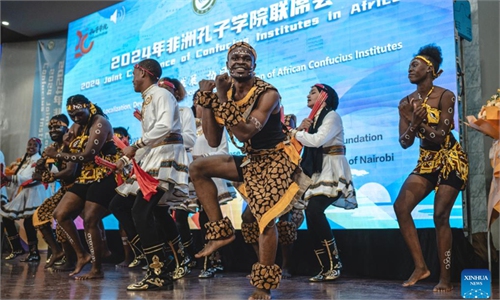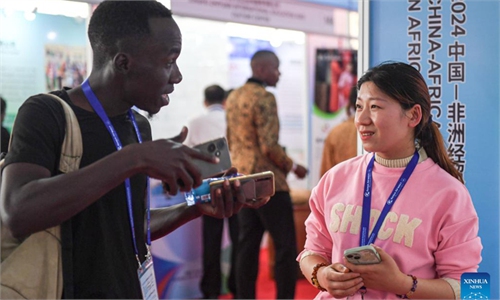IN-DEPTH / IN-DEPTH
China-Africa Rhapsody: ‘Access to Satellite TV for 10,000 African Villages’ project promotes native languages, local dialects in remote rural Africa
‘Access to Satellite TV for 10,000 African Villages’ project promotes native languages, local dialects in remote rural Africa
Editor's Note:
Having enjoyed a long history, friendly exchanges between China and Africa have been deepened in recent years, covering various fields such as politics, economy, and culture. The Global Times is launching a China-Africa Rhapsody series, aiming to showcase the profound human connections and development visions between the two peoples by sharing the true stories of Chinese people in Africa and African people in China. From touching stories of China-Africa cooperation and exciting collisions of youthful ideas to debunking fallacies concocted by some Western sources about China-Africa collaboration, this series hopes to promote closer cooperation and deeper understanding between the peoples of China and Africa.
This installment highlights how China's satellite TV project for 10,000 African villages has supported the promotion of ethnic languages and dialects in remote rural Africa via dubbing in local languages and AI models.
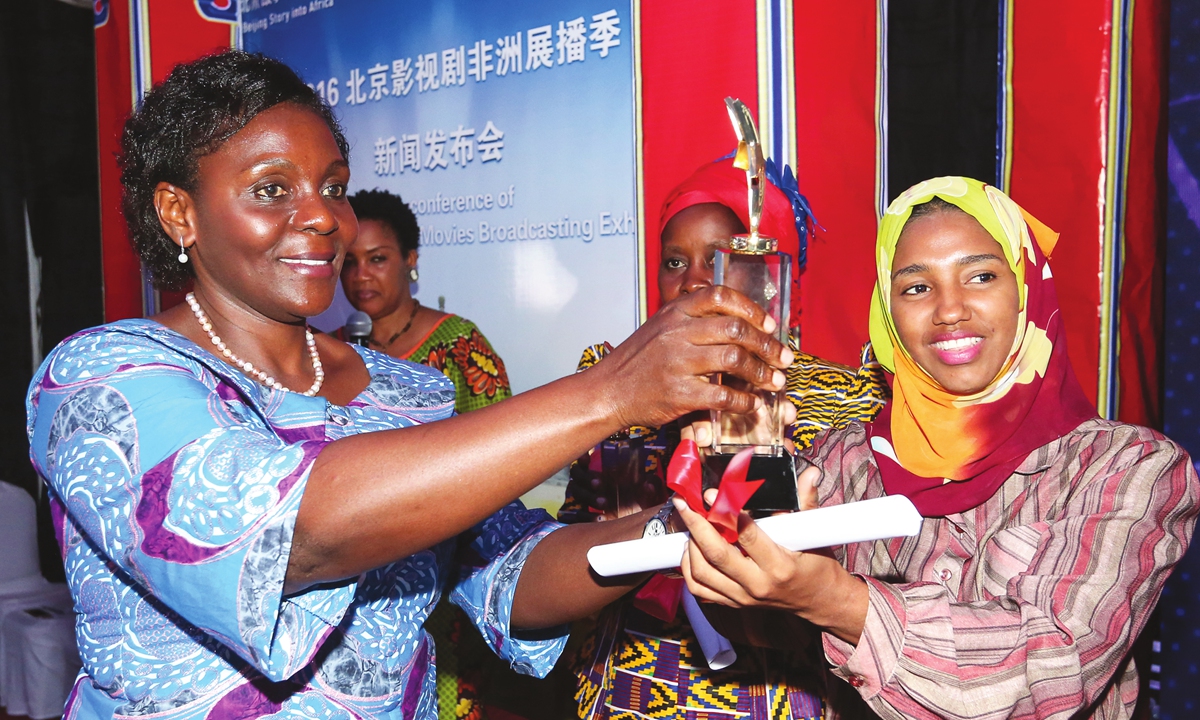
A Chinese digital TV operator may have the answer.
In the village of Bunono near Entebbe, Uganda, villagers excitedly discussed the Africa Cup of Nations 2024 and reminisced on how, in the past, they could only watch games with English commentary, but now they can enjoy commentary in their native Luganda.
StarTimes, a Beijing-based media company, has made this possible through the China-initiated "Access to Satellite TV for 10,000 African Villages" project that aims to connect 10,000 African villages to satellite television programs.
By December 2023, this project had witnessed the successful completion of construction work in 20 African countries, encompassing 9,512 villages and directly benefiting over 190,000 households. Under the project, each recipient village received two sets of solar-powered projector TV systems and one solar digital TV integrated terminal system for public areas free of charge, as confirmed by contractor StarTimes. These installations have become vital conduits for villagers to access information from the outside world, according to the Xinhua News Agency.
During the Africa Cup of Nations 2024 held from January 13 to February 11, StarTimes branches in Uganda, Rwanda, Nigeria, and Tanzania respectively hired sports professionals to provide commentaries in six local languages, which were enthusiastically welcomed. StarTimes strives to enrich the language variety of its digital satellite programs through AI language models, helping to preserve local languages in many remote areas of Africa.
While digital TV operators from the West focus on the high-end market in Africa, the Chinese operator is deeply cultivating the vast rural market in the region, becoming a key player in breaking information barriers and cultural monopolies, and helping more Africans to enter a larger and more diverse world through their native languages.
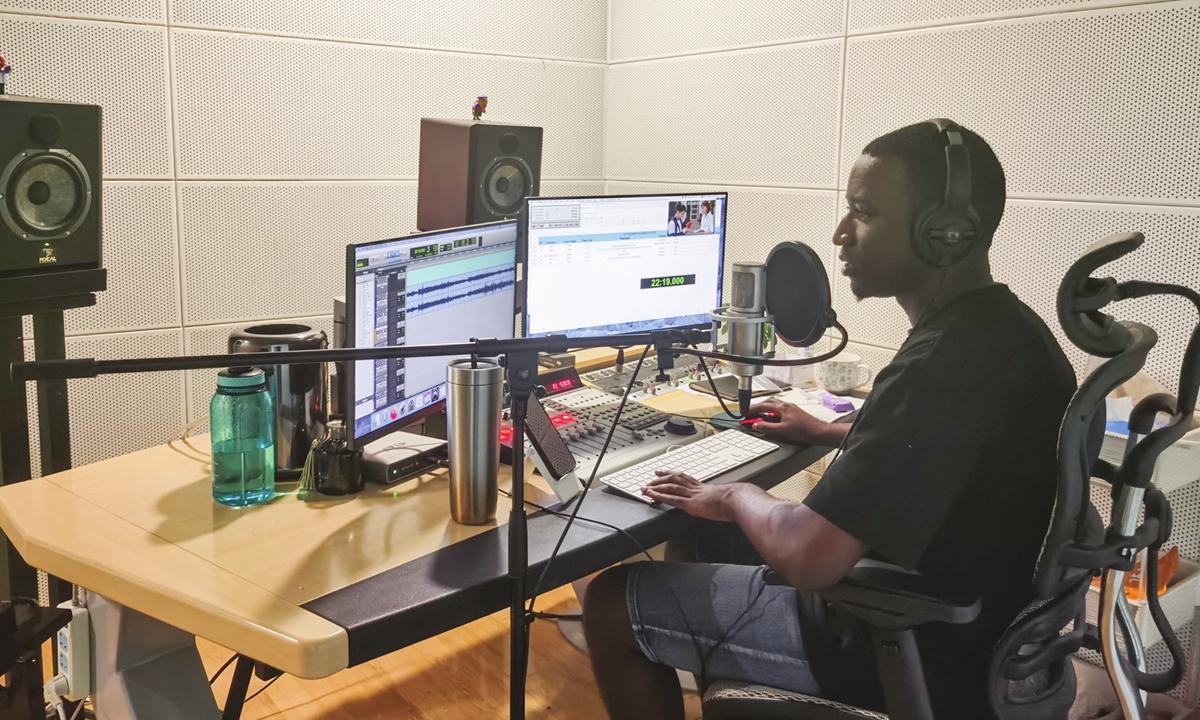
Telling stories in understandable languages
"Although English, French, and Portuguese are official languages in many African countries, a large number of ordinary Africans do not speak these languages when they leave the main cities or even modern buildings. Instead, they speak local languages, especially in remote rural areas. How to bridge this information gap and tell the story of China in languages they truly understand became our priority," William Masy, the PR director of StarTimes, told the Global Times why they started translating and dubbing programs into local languages from 2011.
As the largest television network operator and content provider in Africa, the StarTimes provides multilingual programs - not only major events like the Africa Cup of Nations, but also Chinese TV dramas and localized reality shows - to over 30 countries in sub-Saharan Africa, reaching approximately 16 million African households.
Walking into the StarTimes broadcast center, the Global Times reporter was drawn to the Swahili and Hausa language channels playing Chinese TV dramas on the TV wall.
The bustling Shanghai district of Lujiazui, where the male and female protagonists go on a date in the drama, was translated to Coco Beach in Tanzania's Dar es Salaam, and the male protagonist's name was translated to Mustafa. Apart from the Chinese faces of the actors, everything else was familiar to Swahili-speaking audiences.
"Ratings of some TV dramas dubbed in local languages skyrocketed as soon as they were launched, far exceeding their English versions," Wang Qian, director of the African language channel at StarTimes, told the Global Times. "For example, the Swahili channel in Tanzania can reach an average monthly rating of 5 percent. In China, a TV drama with a rating of over 1 percent would already be considered a success."
In the StarTimes dubbing studio, the Global Times reporter met Alex Herbert Shogotera, a 29-year-old dubbing actor and program host from Tanzania. Shogotera was emotively dubbing a Chinese TV drama in Swahili, complete with rich expressions. Yet, six years ago, he didn't even know what dubbing was.
"Tanzanians love watching Chinese TV dramas because they showcase values such as family bonds, responsibility, and the desire for reunion, which are very familiar and respected in our culture. People are happy to see that they can feel it through their own languages," Shogotera told the Global Times. "This is a closer cultural connection."
In Shogotera's view, Chinese TV programs are not like those provided by Western operators, which "push more of their own agenda, have their own philosophy, and are not compatible with African. That's why Africans do not like them that much."
"Some countries in Africa have many ethnic groups. Nigeria has over 250 ethnic groups while Cameroon has over 230 ethnic groups, and they all speak their own languages in their original states. This means that if we have programs only in English, French, Portuguese, and Chinese, people in the vast African rural areas won't understand our content, let alone deepen their understanding of China," Masy told the Global Times.
Wang summarized their efforts in four words: "Chinese stories, African expressions." She said that some viewers in rural Rwanda were inspired by the Chinese TV drama "Minning Town," as local people were motivated by the drama revolving around getting rich through collective hard work and alleviating poverty in the countryside. Also, some female African viewers commented that they had never thought that women could live in so many different ways until they started watching the Chinese female-themed TV drama "Nothing But Thirty." These experiences have deeply touched, and also meant a lot to, Wang and her colleagues who travel a lot around the African countryside to find out what the locals really like.
At the same time, the Chinese company's promotion of local languages aligns with the cultural confidence strategy of some Central and East African countries like Tanzania, and even the entire Africa, which respects and aims to promote indigenous languages and cultures, such as the Swahili language in East Africa and the Hausa language widely used in West Africa.
In the African Union's Agenda 2063, there is a goal called the African Renaissance, and the specific approach to achieve the African Renaissance is to protect and preserve local cultures and languages.
According to Masy, Western networks and television operators in African countries mainly serve the needs of the elite who want to integrate into a globalized world, promoting English education as much as possible. However, in the vast rural and small-town markets, there is no incentive for the Western countries to promote native language programs considering the expensive and cumbersome process.
"Because it requires substantial financial investment and complex local execution capabilities. The implementation of television programs requires hands-on involvement in every detail, from power supply, antenna installation, operation, and maintenance to program provision," Masy explained.
"To ensure that every African family can access, afford, watch and share the beauty of digital TV" has long been StarTimes' unique operation philosophy. Shogotera told the Global Times, "StarTimes is the only company which offers much lower prices than the average. It's as low as only 15,000 Tanzanian shillings ($6), which means even poor people can afford it, including the lower-income individuals. Some local broadcasters charge three to four times as much."
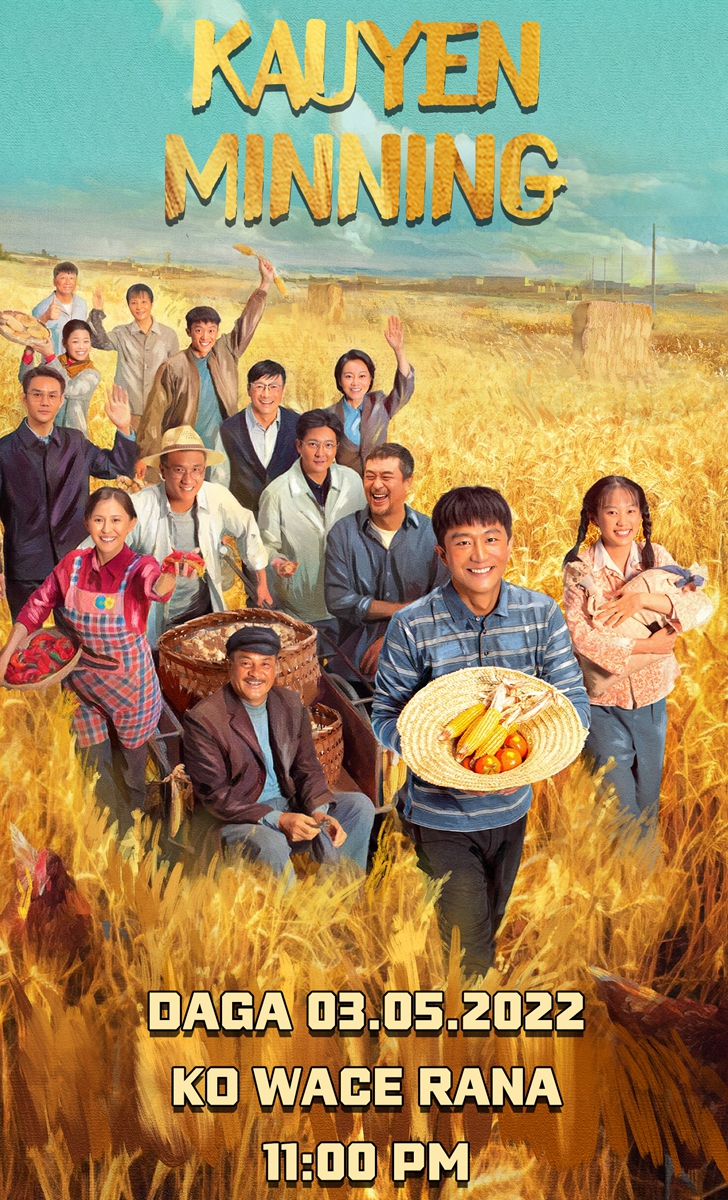
Building a talent pool to promote dreams
To enable more people in rural African areas to have access to digital TV content and Chinese TV dramas that they can understand is inseparable from the support of professional dubbing talents. However, it was difficult in the early stages to find enough African professional voice actors with native language-speaking abilities in China.
A local talent pool incubator was then born.
On the day of the interview, Shogotera allocated a time slot from his very tight schedule to meet with the Global Times reporter at 8.30 am. In the six years he lived in China, Shogotera had fully adapted to the fast-paced, high-intensity work mode, which is the norm in China. He feels like he is learning something new every day.
In 2017, Shogotera saw an advertisement for a dubbing competition held by StarTimes in Mwanza, Tanzania, and he was intrigued. With a strong interest and talent, he made it into the top 10 and was offered an intern opportunity at the headquarters of StarTimes in Beijing. He felt that this was a turning point in his life, just like many of his African colleagues.
Since 2016, StarTimes has held 23 dubbing competitions for Chinese films and television shows in five countries - Tanzania, Nigeria, Cote d'Ivoire, South Africa, and Mozambique, solving the early talent bottleneck challenge. Talents who stood out were invited to Beijing for training and work, following a career path that would allow them to become media professionals like Shogotera.
"Studying in China was more attractive than the big prize. China is very attractive to many Africans, both in terms of the education system and the development level, and the cost of living is not as high as in other developed countries," Shogotera said. "So the competition in these contests is very fierce."
When talking about the impression of China, Shogotera said that in his hometown, many people still hold outdated impressions that every Chinese person knows kung fu or that Chinese people eat everything, and many Tanzanians believe that Chinese people always wear traditional clothing like qipao.
"These impressions come from the long-term misrepresentation by some Western media sources, which is also one of the reasons why StarTimes wants to deepen its presence in Africa," Masy said. With "Access to Satellite TV for 10,000 African Villages," there are channels to spread China's voice and the image of modern China.
Shogotera is now a bridge of China-African cultural exchanges. He loves to share stories in China and dispel misunderstandings around China. As a history major, he believes that China's development path is much more peaceful than those of other countries. Shogotera said that in his hometown, many railways, hydropower stations, and other infrastructure have been built by Chinese companies. He feels that these efforts make him love China even more and encourage him to understand the real China.

Having enjoyed a long history, friendly exchanges between China and Africa have been deepened in recent years, covering various fields such as politics, economy, and culture. The Global Times is launching a China-Africa Rhapsody series, aiming to showcase the profound human connections and development visions between the two peoples by sharing the true stories of Chinese people in Africa and African people in China. From touching stories of China-Africa cooperation and exciting collisions of youthful ideas to debunking fallacies concocted by some Western sources about China-Africa collaboration, this series hopes to promote closer cooperation and deeper understanding between the peoples of China and Africa.
This installment highlights how China's satellite TV project for 10,000 African villages has supported the promotion of ethnic languages and dialects in remote rural Africa via dubbing in local languages and AI models.

Anastazia Wambura, deputy minister of Information, Culture, Artists and Sports of Tanzania, presents an award to the winner of a Chinese TV drama dubbing competition held in Tanzania in September 2016. Photo: Hu Yuwei/GT
How are Chinese TV programs dubbed in local African languages and dialects further popularized among rural African families?A Chinese digital TV operator may have the answer.
In the village of Bunono near Entebbe, Uganda, villagers excitedly discussed the Africa Cup of Nations 2024 and reminisced on how, in the past, they could only watch games with English commentary, but now they can enjoy commentary in their native Luganda.
StarTimes, a Beijing-based media company, has made this possible through the China-initiated "Access to Satellite TV for 10,000 African Villages" project that aims to connect 10,000 African villages to satellite television programs.
By December 2023, this project had witnessed the successful completion of construction work in 20 African countries, encompassing 9,512 villages and directly benefiting over 190,000 households. Under the project, each recipient village received two sets of solar-powered projector TV systems and one solar digital TV integrated terminal system for public areas free of charge, as confirmed by contractor StarTimes. These installations have become vital conduits for villagers to access information from the outside world, according to the Xinhua News Agency.
During the Africa Cup of Nations 2024 held from January 13 to February 11, StarTimes branches in Uganda, Rwanda, Nigeria, and Tanzania respectively hired sports professionals to provide commentaries in six local languages, which were enthusiastically welcomed. StarTimes strives to enrich the language variety of its digital satellite programs through AI language models, helping to preserve local languages in many remote areas of Africa.
While digital TV operators from the West focus on the high-end market in Africa, the Chinese operator is deeply cultivating the vast rural market in the region, becoming a key player in breaking information barriers and cultural monopolies, and helping more Africans to enter a larger and more diverse world through their native languages.

Swahili language dubbing actor Alex Herbert Shogotera at work in Beijing on May 28, 2024 Photo: Hu Yuwei/GT
Telling stories in understandable languages
"Although English, French, and Portuguese are official languages in many African countries, a large number of ordinary Africans do not speak these languages when they leave the main cities or even modern buildings. Instead, they speak local languages, especially in remote rural areas. How to bridge this information gap and tell the story of China in languages they truly understand became our priority," William Masy, the PR director of StarTimes, told the Global Times why they started translating and dubbing programs into local languages from 2011.
As the largest television network operator and content provider in Africa, the StarTimes provides multilingual programs - not only major events like the Africa Cup of Nations, but also Chinese TV dramas and localized reality shows - to over 30 countries in sub-Saharan Africa, reaching approximately 16 million African households.
Walking into the StarTimes broadcast center, the Global Times reporter was drawn to the Swahili and Hausa language channels playing Chinese TV dramas on the TV wall.
The bustling Shanghai district of Lujiazui, where the male and female protagonists go on a date in the drama, was translated to Coco Beach in Tanzania's Dar es Salaam, and the male protagonist's name was translated to Mustafa. Apart from the Chinese faces of the actors, everything else was familiar to Swahili-speaking audiences.
"Ratings of some TV dramas dubbed in local languages skyrocketed as soon as they were launched, far exceeding their English versions," Wang Qian, director of the African language channel at StarTimes, told the Global Times. "For example, the Swahili channel in Tanzania can reach an average monthly rating of 5 percent. In China, a TV drama with a rating of over 1 percent would already be considered a success."
In the StarTimes dubbing studio, the Global Times reporter met Alex Herbert Shogotera, a 29-year-old dubbing actor and program host from Tanzania. Shogotera was emotively dubbing a Chinese TV drama in Swahili, complete with rich expressions. Yet, six years ago, he didn't even know what dubbing was.
"Tanzanians love watching Chinese TV dramas because they showcase values such as family bonds, responsibility, and the desire for reunion, which are very familiar and respected in our culture. People are happy to see that they can feel it through their own languages," Shogotera told the Global Times. "This is a closer cultural connection."
In Shogotera's view, Chinese TV programs are not like those provided by Western operators, which "push more of their own agenda, have their own philosophy, and are not compatible with African. That's why Africans do not like them that much."
"Some countries in Africa have many ethnic groups. Nigeria has over 250 ethnic groups while Cameroon has over 230 ethnic groups, and they all speak their own languages in their original states. This means that if we have programs only in English, French, Portuguese, and Chinese, people in the vast African rural areas won't understand our content, let alone deepen their understanding of China," Masy told the Global Times.
Wang summarized their efforts in four words: "Chinese stories, African expressions." She said that some viewers in rural Rwanda were inspired by the Chinese TV drama "Minning Town," as local people were motivated by the drama revolving around getting rich through collective hard work and alleviating poverty in the countryside. Also, some female African viewers commented that they had never thought that women could live in so many different ways until they started watching the Chinese female-themed TV drama "Nothing But Thirty." These experiences have deeply touched, and also meant a lot to, Wang and her colleagues who travel a lot around the African countryside to find out what the locals really like.
At the same time, the Chinese company's promotion of local languages aligns with the cultural confidence strategy of some Central and East African countries like Tanzania, and even the entire Africa, which respects and aims to promote indigenous languages and cultures, such as the Swahili language in East Africa and the Hausa language widely used in West Africa.
In the African Union's Agenda 2063, there is a goal called the African Renaissance, and the specific approach to achieve the African Renaissance is to protect and preserve local cultures and languages.
According to Masy, Western networks and television operators in African countries mainly serve the needs of the elite who want to integrate into a globalized world, promoting English education as much as possible. However, in the vast rural and small-town markets, there is no incentive for the Western countries to promote native language programs considering the expensive and cumbersome process.
"Because it requires substantial financial investment and complex local execution capabilities. The implementation of television programs requires hands-on involvement in every detail, from power supply, antenna installation, operation, and maintenance to program provision," Masy explained.
"To ensure that every African family can access, afford, watch and share the beauty of digital TV" has long been StarTimes' unique operation philosophy. Shogotera told the Global Times, "StarTimes is the only company which offers much lower prices than the average. It's as low as only 15,000 Tanzanian shillings ($6), which means even poor people can afford it, including the lower-income individuals. Some local broadcasters charge three to four times as much."

A poster for Hausa language version of the Chinese TV drama series Minning Town. Photo: Courtesy of StarTimes
Building a talent pool to promote dreams
To enable more people in rural African areas to have access to digital TV content and Chinese TV dramas that they can understand is inseparable from the support of professional dubbing talents. However, it was difficult in the early stages to find enough African professional voice actors with native language-speaking abilities in China.
A local talent pool incubator was then born.
On the day of the interview, Shogotera allocated a time slot from his very tight schedule to meet with the Global Times reporter at 8.30 am. In the six years he lived in China, Shogotera had fully adapted to the fast-paced, high-intensity work mode, which is the norm in China. He feels like he is learning something new every day.
In 2017, Shogotera saw an advertisement for a dubbing competition held by StarTimes in Mwanza, Tanzania, and he was intrigued. With a strong interest and talent, he made it into the top 10 and was offered an intern opportunity at the headquarters of StarTimes in Beijing. He felt that this was a turning point in his life, just like many of his African colleagues.
Since 2016, StarTimes has held 23 dubbing competitions for Chinese films and television shows in five countries - Tanzania, Nigeria, Cote d'Ivoire, South Africa, and Mozambique, solving the early talent bottleneck challenge. Talents who stood out were invited to Beijing for training and work, following a career path that would allow them to become media professionals like Shogotera.
"Studying in China was more attractive than the big prize. China is very attractive to many Africans, both in terms of the education system and the development level, and the cost of living is not as high as in other developed countries," Shogotera said. "So the competition in these contests is very fierce."
When talking about the impression of China, Shogotera said that in his hometown, many people still hold outdated impressions that every Chinese person knows kung fu or that Chinese people eat everything, and many Tanzanians believe that Chinese people always wear traditional clothing like qipao.
"These impressions come from the long-term misrepresentation by some Western media sources, which is also one of the reasons why StarTimes wants to deepen its presence in Africa," Masy said. With "Access to Satellite TV for 10,000 African Villages," there are channels to spread China's voice and the image of modern China.
Shogotera is now a bridge of China-African cultural exchanges. He loves to share stories in China and dispel misunderstandings around China. As a history major, he believes that China's development path is much more peaceful than those of other countries. Shogotera said that in his hometown, many railways, hydropower stations, and other infrastructure have been built by Chinese companies. He feels that these efforts make him love China even more and encourage him to understand the real China.


